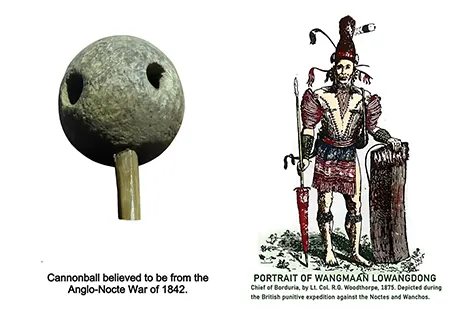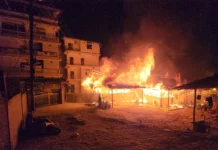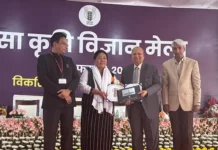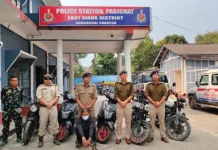KHONSA, 28 Jun: Tirap Deputy Commissioner Techu Aran has formally acknowledged and recorded the heroic acts of Nocte freedom fighters Wangto Lowang and Wangmaan Lowangdong in recognition of their invaluable contributions made in resisting colonial forces and defending their homeland.
Lowang, the then chief of Kheti village, valiantly led his people during the Anglo-Nocte War of 1842, resisting British colonial expansion in the region.
The war began on 25 November, 1842, when Captain J Brodie, then sub-assistant of Sibsagar, Assam, and his soldiers marched towards Kheti to challenge Lowang’s sovereign rule.
During the confrontation, one British soldier was killed and four others were injured, forcing the detachment to retreat.
In retaliation, a British force was assembled, consisting of detachments from the Assam Light Infantry Battalion, the 2nd Sebundies, and the local artillery company, led by captain Brodie, captain SF Hannay, lieutenant Rowlatt, and lieutenant Reid. The combined British forces then launched a punitive expedition against Kheti on 23 December, 1842.
Lowang and his people valiantly resisted the heavily armed British troops, but were ultimately forced to retreat and abandon their village.
The British forces burned down Kheti and established an Army outpost in the neighbouring village of Khela to deter future acts of resistance. This marked the end of the first Anglo-Nocte War on 29 December, 1842.
Lowangdong, the then chief of Borduria village, stood at the forefront of the Nocte Resistance of 1875, opposing colonial incursions and asserting the sovereignty of his people. The event took place on 18 May.
The resistance began in August 1874, when colonel RH Keatinge, the first chief commissioner of British Assam, issued a notice through lieutenant Holcombe, then assistant commissioner of Jeypore, Assam. The notice stated that the Government of British India intended to annex the Namsang and Hukanjuri tea gardens, along with the tract of land between them. Lieutenant Holcombe further warned Lowangdong that any act of aggression would be met with swift military retaliation, as Borduria village occupied an exposed position, easily assailable from Assam. Although Lowangdong wished to retaliate, he did not want his people to suffer at the hands of the superior British forces.
Therefore, he coerced the chief of Ninu village and its allies into killing lieutenant Holcombe and his survey team by threatening to cut off vital salt supplies and block the strategic trade route to Assam.
This incident triggered the Anglo-Wancho War of 1875.
Following an investigation, CU Aitchison, secretary to the Government of British India, concluded that Wangmaan had orchestrated the attack and directed the course of the war.
As a result, on 18 May, 1875, the British formally annexed the tea gardens and the tract between them.
Additionally, Lowangdong was ordered to retrieve and surrender all arms lost at Ninu and capture one of the fugitives involved in the conflict.
The recognition is based on authentic documentation retrieved from the National Archives of India, New Delhi, and presented by Wangtum H Lowang, director of ‘Nocte Digest’.
“These two events represent not only courage and leadership of the Nocte people, but also a broader narrative of indigenous resistance that has long remained underrepresented in mainstream history,” the DC said.
“Their legacy shall now be formally recorded, honoured, and shared,” he said.
The names and contributions of these two chiefs will be archived officially in the district records and may be referenced to in future commemorative events, educational materials and cultural initiatives, the DC said.
All government departments and educational institutions have been advised to extend support in preserving and disseminating this vital chapter of regional history. (DIPRO)





